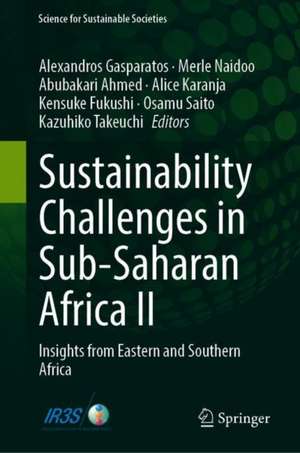Sustainability Challenges in Sub-Saharan Africa II: Insights from Eastern and Southern Africa: Science for Sustainable Societies
Editat de Alexandros Gasparatos, Merle Naidoo, Abubakari Ahmed, Alice Karanja, Kensuke Fukushi, Osamu Saito, Kazuhiko Takeuchien Limba Engleză Hardback – 6 sep 2020
Parts I-II highlight specific case studies onmajor sustainability challenges from Eastern and Southern Africa. Part III synthesizes the main lessons learnt from the chapters in the two edited volumes.
| Toate formatele și edițiile | Preț | Express |
|---|---|---|
| Paperback (1) | 551.53 lei 38-45 zile | |
| Springer Nature Singapore – 7 sep 2021 | 551.53 lei 38-45 zile | |
| Hardback (1) | 558.75 lei 38-45 zile | |
| Springer Nature Singapore – 6 sep 2020 | 558.75 lei 38-45 zile |
Preț: 558.75 lei
Preț vechi: 689.81 lei
-19% Nou
Puncte Express: 838
Preț estimativ în valută:
106.91€ • 111.63$ • 88.49£
106.91€ • 111.63$ • 88.49£
Carte tipărită la comandă
Livrare economică 31 martie-07 aprilie
Preluare comenzi: 021 569.72.76
Specificații
ISBN-13: 9789811553578
ISBN-10: 9811553572
Pagini: 268
Ilustrații: XI, 268 p. 35 illus., 25 illus. in color.
Dimensiuni: 155 x 235 mm
Greutate: 0.5 kg
Ediția:1st ed. 2020
Editura: Springer Nature Singapore
Colecția Springer
Seria Science for Sustainable Societies
Locul publicării:Singapore, Singapore
ISBN-10: 9811553572
Pagini: 268
Ilustrații: XI, 268 p. 35 illus., 25 illus. in color.
Dimensiuni: 155 x 235 mm
Greutate: 0.5 kg
Ediția:1st ed. 2020
Editura: Springer Nature Singapore
Colecția Springer
Seria Science for Sustainable Societies
Locul publicării:Singapore, Singapore
Cuprins
Part I Eastern Africa.- Tackling child malnutrition by strengthening the linkage between agricultural production, food security and nutrition in rural Rwanda.- Weather Shocks, Gender and Household Consumption: Evidence from Urban Households in the Teso Sub-region, Uganda.- Indigenous and Local Knowledge practices and innovations for enhancing food security under climate change: Examples from Mijikenda communities in coastal Kenya.- Reframing the challenges and opportunities for improved sanitation services in eastern Africa through Sustainability Science.- Part II Southern Africa.- Ethanol as a clean cooking alternative in Sub-Saharan Africa: Insights from sugarcane production and ethanol adoption sites in Malawi and Mozambique.- The effect of introduced Opuntia (Cactaceae) species on landscape connectivity and ecosystem service provision in southern Madagascar.- The Legacy of Mine Closure in Kabwe, Zambia: What can resilience thinking offer to the mining sustainability discourse?.- Knowledge co-production in Sub-Saharan African cities: Building capacity for the Urban Age.- Part III Synthesis.- Harnessing science-policy interface processes to tackle sustainability challenges in Sub-Saharan Africa.- Sustainability challenges in Sub-Saharan Africa: Trade-offs, opportunities and priority areas for Sustainability Science.
Textul de pe ultima copertă
The aim of this two-volume book series is to highlight some of the most pervasive sustainability challenges that Sub-Saharan Africa faces. The two volumes contain 20 chapters that illustrate very diverse sustainability challenges throughout the continent, adopting interdisciplinary and problem-oriented research approaches, and methods from the natural and the social sciences. The very diverse case study chapters are put into perspective with chapters that introduce key sustainability challenges using a regional focus. Through this multi-scale and interdisciplinary approach the two volumes provide an authoritative source about the major sustainability challenges in the continent, and how to mobilise such perspectives to develop appropriate solutions. The two volumes have a uniquely broad focus that fills a major gap in the emerging Sustainability Science scholarship.
Parts I-II highlight specific case studies on major sustainability challenges from Eastern and Southern Africa. Part III synthesizes the main lessons learnt from the chapters in the two edited volumes.
Parts I-II highlight specific case studies on major sustainability challenges from Eastern and Southern Africa. Part III synthesizes the main lessons learnt from the chapters in the two edited volumes.
Caracteristici
Shed light on how sustainability science approaches can help solve some of the pervasive challenges that Africa faces Offers local case studies throughout Africa that adopt transdisciplinary and problem-oriented research approaches using methodologies from the natural and the social sciences Provides an authoritative source of information on how sustainability science approaches sustainability challenges in African contexts through the multi-scale and inter/transdisciplinary approach















